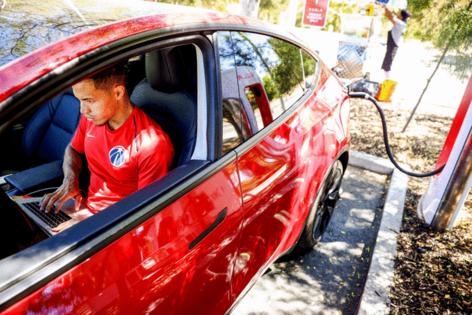California now has more EV charging ports than gas nozzles
Published in Automotive News
There has been a shift in what moves California.
Electric vehicle charging ports now outnumber gas nozzles across the Golden State, a sign of the increasing number of zero-emission vehicles on the road. But the milestone arrives as the federal government has moved to deprioritize the shift away from gasoline-powered cars.
California has steadily amassed its EV charging network with both public and private charging ports over the last few years. In 2024, California boasted 178,500 total EV ports compared to around 120,000 estimated gas nozzles, according to the California Energy Commission.
The number of accessible chargers across California has nearly doubled since 2022. Just since August, the last time these figures were publicly updated, the state has recorded roughly 26,000 additional publicly accessible EV chargers.
The commission estimates that more than 162,000 chargers are Level 2, which can provide roughly 14 to 35 miles of range per hour of charging, and nearly 17,000 are considered fast chargers — which juice up a vehicle in minutes. Many hybrid vehicles are not equipped to work with fast chargers, however.
More than 700,000 Level 2 chargers are installed across the state in single-family homes, according to state estimates.
All of this expansion is taking place as California aims to ban the sale of gas-powered vehicles in the state by 2035 — though those plans have come under fire by the Trump administration and congressional Republicans.
"The California EV driver experience is getting better by the day," CEC Chairman David Hochschild said in a statement. "The state will continue to heavily invest in EV infrastructure, with particular emphasis in hard-to-reach areas, making these vehicles an easy choice for new car buyers."
Part of the dramatic increase in the statewide tally is due to new data sources that track operational chargers, though there has also been a large increase in new chargers installed, the agency said. Roughly 73,500 chargers were incorporated into the state's data in 2024, but only approximately 38,000 of those were newly installed chargers.
Nationwide, the EV market now has to tangle with a major obstacle: the White House. The Trump administration has signaled fierce opposition and taken steps to reverse policies enacted by former President Joe Biden that were intended to bolster the EV market and phase out gas-powered vehicles — including the goal for EVs to make up half of new cars sold in the U.S. by 2030.
The federal government has paused a $15-million grant to expand Oregon's EV charging network, according to the Portland Business Journal, and the Miami Herald reports a similar pattern for Florida's plans to build more EV charging ports.
In August, the U.S. Department of Transportation awarded 29 states, eight federally recognized tribes and the District of Columbia $521 million to expand the nation's EV charging network. California received nearly $150 million for the construction of more than 9,200 EV charging ports, with $15 million meant to go toward building them in underserved communities in Los Angeles County.
Across the country and Puerto Rico, there are more than 77,300 EV charging stations and roughly 216,400 public ports, according to the latest federal data from the Joint Office of Energy and Transportation.
_____
©2025 Los Angeles Times. Visit latimes.com. Distributed by Tribune Content Agency, LLC.








Comments